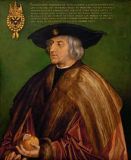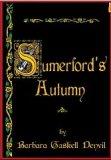Sumerford’s Autumn
Book Review: Sumerford’s Autumn
Barbara Gaskell Denvil, Sumerford’s Autumn. Simon & Schuster Australia, June 2013. ISBN 9781922052582 (620 pages)
The following review was presented to the NSW Branch of the Richard III Society at the general meeting on 9 June 2012.
After reading Barbara Gaskell Denvil’s previous “Ricardian” novel, Satin Cinnabar, I could not resist getting her new Sumerford’s Autumn as soon as it became available for Amazon Kindle in late April 2012.
While Satin Cinnabar was set in the immediate aftermath of the Battle of Bosworth, this novel starts a few years later, in 1497. It tells the story of the Sumerford family, the Earl of Sumerford and his wife and their four very different sons. The Sumerfords were supporters of Richard III, but now have come to uneasy terms with Henry VII, especially the Earl is most unwilling to upset this peace. The question whether Perkin Warbeck really was Richard of York, the younger of Edward IV’s sons, is one of its central themes. It follows the fate of this young man through the last years of his life. Although he does appear in the narrative, he remains fairly nondescript. Barbara rather tells us how this enigma affects those around him.
The oldest Sumerford son, Humphrey, the heir of title and estate, is somewhat simple and tends to be underestimated for most of the story. Ludovic, the youngest, is the main character of the novel. He has not much to expect in the way of inheritance and we find out later where his funds come from, though his brother Brice seems to be much more affluent. The other brother, Gerald, is the political one of the lot and believes that the young man officially known as Perkin Warbeck really is Richard Plantagenet and is prepared to risk his life to have him recognized as the rightful king. However, eventually the whole family finds itself caught up in this controversy, one way or the other. Four sons, four secrets and agendas, and four very different personalities combine to create an atmosphere of brooding and aggravated unease at Sumerford Castle.
Thrown into the mix are two main female characters: Humphrey’s rather mysterious bride Jennine, who does not at all behave in the way a lady with her apparent background should behave; and Alyssson, who displays much more strength of character than might be expected from her humble background.
In the course of the novel we get to know and respect the Earl of Sumerford better and understand his relationship with his countess as well as his son and heir, Humphrey.
From the beginning with the tragic death of a boy, the reader is hooked till the end when everything will be revealed. Like Satin Cinnabar, Sumerford’s Autumn is a tale of adventure, a bit of crime mixed with romance and lots of danger.
The characters are well-developed and show individuality. Her male lead is not superman, but a real person; and her female lead is not a swooning damsel in distress. The love story in this novel, as is the one in Satin Cinnabar, is not the rather cloying kind we sometimes find in historical fiction, but is refreshing and honest.
I understand from the author that the theme of Perkin Warbeck has haunted her for some time (hence her Lambert Simnel article which she offered for our branch website some time ago).
As you will know I have been interested in the Perkin Warbeck question for some time, since choosing him several years ago as a topic for a Scrabble talk*. Barbara has treated the topic with sensitivity and her careful research is apparent.
I can only recommend this book to anyone interested in the period. The adventure will keep you hooked from the first to the last “page”. You will enjoy the love story and the variety of well developed characters.
I just heard this morning from Barbara that her next novel is set to start in 1482 and promises to be another treat for the Ricardian.
Don’t forget to have a look at the trailer of Sumerford’s Autumn on YouTube.
* Once a year members draw Scrabble tiles out of a bag and then prepare a short talk on a topic starting with their letter.
Tags: Books, Perkin Warbeck



